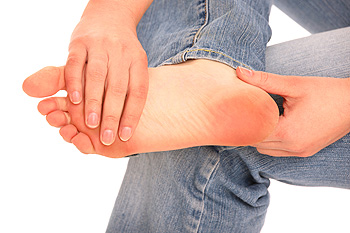Garner (919) 661-4150
October 2020
Why Live with Pain and Numbness in Your Feet?
Reasons for Developing Plantar Fasciitis
 The pain and discomfort that is found in plantar fasciitis is located in the heel and arch area of the foot. It develops as a result of inflammation that affects the plantar fascia. The plantar fascia is a band of tissue that connects the heel to the toes and runs along the bottom of the foot. The contributing factors for developing plantar fasciitis can include standing on hard surfaces for the majority of the day and wearing uncomfortable shoes, such as high heels. Additionally, patients who have gained weight may develop this ailment, and it can affect people who have low or high arches. The pain that accompanies plantar fasciitis can be debilitating, and it is strongly suggested that you are under the care of a podiatrist if you are experiencing heel pain.
The pain and discomfort that is found in plantar fasciitis is located in the heel and arch area of the foot. It develops as a result of inflammation that affects the plantar fascia. The plantar fascia is a band of tissue that connects the heel to the toes and runs along the bottom of the foot. The contributing factors for developing plantar fasciitis can include standing on hard surfaces for the majority of the day and wearing uncomfortable shoes, such as high heels. Additionally, patients who have gained weight may develop this ailment, and it can affect people who have low or high arches. The pain that accompanies plantar fasciitis can be debilitating, and it is strongly suggested that you are under the care of a podiatrist if you are experiencing heel pain.
Plantar fasciitis can be very painful and inconvenient. If you are experiencing heel pain or symptoms of plantar fasciitis, contact Chukwuma Ukata, DPM from Advanced Carolina Foot and Ankle Center. Our doctor can provide the care you need to keep you pain-free and on your feet.
What Is Plantar Fasciitis?
Plantar fasciitis is the inflammation of the thick band of tissue that runs along the bottom of your foot, known as the plantar fascia, and causes mild to severe heel pain.
What Causes Plantar Fasciitis?
- Excessive running
- Non-supportive shoes
- Overpronation
- Repeated stretching and tearing of the plantar fascia
How Can It Be Treated?
- Conservative measures – anti-inflammatories, ice packs, stretching exercises, physical therapy, orthotic devices
- Shockwave therapy – sound waves are sent to the affected area to facilitate healing and are usually used for chronic cases of plantar fasciitis
- Surgery – usually only used as a last resort when all else fails. The plantar fascia can be surgically detached from the heel
While very treatable, plantar fasciitis is definitely not something that should be ignored. Especially in severe cases, speaking to your doctor right away is highly recommended to avoid complications and severe heel pain. Your podiatrist can work with you to provide the appropriate treatment options tailored to your condition.
If you have any questions please feel free to contact our office located in Garner, NC . We offer the newest diagnostic and treatment technologies for all your foot and ankle needs.
What is Metatarsalgia?
 Metatarsalgia refers to pain that is in the ball of the foot. This term refers to the metatarsal bones that are in this area, and the pain is often a result of repetitive bursts that occur in this part of the foot and eventually overload the metatarsals. Pain over the top and sole of the foot between the 2nd and 4th toes is the most common sign of metatarsalgia. Often, this pain is worsened by pushing off while walking or running. If you are experiencing pain in the forefoot that may be metatarsalgia, it is important to consult with a podiatrist. A podiatrist will check to make sure there is no other damage in the area and prescribe a treatment method. Treatment usually starts with rest and icing the foot, and may include medicine or orthotics.
Metatarsalgia refers to pain that is in the ball of the foot. This term refers to the metatarsal bones that are in this area, and the pain is often a result of repetitive bursts that occur in this part of the foot and eventually overload the metatarsals. Pain over the top and sole of the foot between the 2nd and 4th toes is the most common sign of metatarsalgia. Often, this pain is worsened by pushing off while walking or running. If you are experiencing pain in the forefoot that may be metatarsalgia, it is important to consult with a podiatrist. A podiatrist will check to make sure there is no other damage in the area and prescribe a treatment method. Treatment usually starts with rest and icing the foot, and may include medicine or orthotics.
Foot Pain
Foot pain can be extremely painful and debilitating. If you have a foot pain, consult with Chukwuma Ukata, DPM from Advanced Carolina Foot and Ankle Center. Our doctor will assess your condition and provide you with quality foot and ankle treatment.
Causes
Foot pain is a very broad condition that could be caused by one or more ailments. The most common include:
- Bunions
- Hammertoes
- Plantar Fasciitis
- Bone Spurs
- Corns
- Tarsal Tunnel Syndrome
- Ingrown Toenails
- Arthritis (such as Gout, Rheumatoid, and Osteoarthritis)
- Flat Feet
- Injury (from stress fractures, broken toe, foot, ankle, Achilles tendon ruptures, and sprains)
- And more
Diagnosis
To figure out the cause of foot pain, podiatrists utilize several different methods. This can range from simple visual inspections and sensation tests to X-rays and MRI scans. Prior medical history, family medical history, and any recent physical traumatic events will all be taken into consideration for a proper diagnosis.
Treatment
Treatment depends upon the cause of the foot pain. Whether it is resting, staying off the foot, or having surgery; podiatrists have a number of treatment options available for foot pain.
If you have any questions, please feel free to contact our office located in Garner, NC . We offer the newest diagnostic and treatment technologies for all your foot care needs.
Symptoms of Morton’s Neuroma
 Many patients feel pain in the ball of their foot when the medical condition that is known as Morton’s neuroma exists. Additional symptoms can include a tingling or numbing sensation, and it may feel like there is a small stone or pebble in your shoe. It is an ailment that typically develops gradually and may occur from wearing shoes that do not fit correctly. There may also be medical conditions that can cause Morton’s neuroma. These can consist of having flat feet, bunions, hammertoes, or high arches. Mild relief may be found when wearing custom-made orthotics, shoes that are worn have adequate room in the toe area, or from getting foot massages that target the affected area. If you have symptoms of Morton’s neuroma, it is recommended that you speak with a podiatrist who can effectively treat this condition.
Many patients feel pain in the ball of their foot when the medical condition that is known as Morton’s neuroma exists. Additional symptoms can include a tingling or numbing sensation, and it may feel like there is a small stone or pebble in your shoe. It is an ailment that typically develops gradually and may occur from wearing shoes that do not fit correctly. There may also be medical conditions that can cause Morton’s neuroma. These can consist of having flat feet, bunions, hammertoes, or high arches. Mild relief may be found when wearing custom-made orthotics, shoes that are worn have adequate room in the toe area, or from getting foot massages that target the affected area. If you have symptoms of Morton’s neuroma, it is recommended that you speak with a podiatrist who can effectively treat this condition.
Morton’s neuroma is a very uncomfortable condition to live with. If you think you have Morton’s neuroma, contact Chukwuma Ukata, DPM of Advanced Carolina Foot and Ankle Center. Our doctor will attend to all of your foot care needs and answer any of your related questions.
Morton’s Neuroma
Morton's neuroma is a painful foot condition that commonly affects the areas between the second and third or third and fourth toe, although other areas of the foot are also susceptible. Morton’s neuroma is caused by an inflamed nerve in the foot that is being squeezed and aggravated by surrounding bones.
What Increases the Chances of Having Morton’s Neuroma?
- Ill-fitting high heels or shoes that add pressure to the toe or foot
- Jogging, running or any sport that involves constant impact to the foot
- Flat feet, bunions, and any other foot deformities
Morton’s neuroma is a very treatable condition. Orthotics and shoe inserts can often be used to alleviate the pain on the forefront of the feet. In more severe cases, corticosteroids can also be prescribed. In order to figure out the best treatment for your neuroma, it’s recommended to seek the care of a podiatrist who can diagnose your condition and provide different treatment options.
If you have any questions, please feel free to contact our office located in Garner, NC . We offer the newest diagnostic and treatment technologies for all your foot care needs.
Basics to Prevent Falling
 Research has indicated that falling is a leading cause of injury in older people. Many patients can experience a fear of falling, and this can lead to the inability to perform daily activities. Falling may be caused by several factors, including wearing shoes that do not fit correctly, having poor vision, taking multiple medications, or rushing and walking too quickly. There are effective prevention methods that can be implemented, which may help to prevent falling episodes. These can consist of removing worn rugs from the living environment, and improving lighting in the household. Additionally, it is beneficial to engage in a routine exercise program as this can be helpful in improving overall strength. If you would like more information about how falling can affect the feet, please confer with a podiatrist.
Research has indicated that falling is a leading cause of injury in older people. Many patients can experience a fear of falling, and this can lead to the inability to perform daily activities. Falling may be caused by several factors, including wearing shoes that do not fit correctly, having poor vision, taking multiple medications, or rushing and walking too quickly. There are effective prevention methods that can be implemented, which may help to prevent falling episodes. These can consist of removing worn rugs from the living environment, and improving lighting in the household. Additionally, it is beneficial to engage in a routine exercise program as this can be helpful in improving overall strength. If you would like more information about how falling can affect the feet, please confer with a podiatrist.
Preventing falls among the elderly is very important. If you are older and have fallen or fear that you are prone to falling, consult with Chukwuma Ukata, DPM from Advanced Carolina Foot and Ankle Center. Our doctor will assess your condition and provide you with quality advice and care.
Every 11 seconds, an elderly American is being treated in an emergency room for a fall related injury. Falls are the leading cause of head and hip injuries for those 65 and older. Due to decreases in strength, balance, senses, and lack of awareness, elderly persons are very susceptible to falling. Thankfully, there are a number of things older persons can do to prevent falls.
How to Prevent Falls
Some effective methods that older persons can do to prevent falls include:
- Enrolling in strength and balance exercise program to increase balance and strength
- Periodically having your sight and hearing checked
- Discuss any medications you have with a doctor to see if it increases the risk of falling
- Clearing the house of falling hazards and installing devices like grab bars and railings
- Utilizing a walker or cane
- Wearing shoes that provide good support and cushioning
- Talking to family members about falling and increasing awareness
Falling can be a traumatic and embarrassing experience for elderly persons; this can make them less willing to leave the house, and less willing to talk to someone about their fears of falling. Doing such things, however, will increase the likelihood of tripping or losing one’s balance. Knowing the causes of falling and how to prevent them is the best way to mitigate the risk of serious injury.
If you have any questions, please feel free to contact our office located in Garner, NC . We offer the newest diagnostic and treatment technologies for all your foot care needs.







